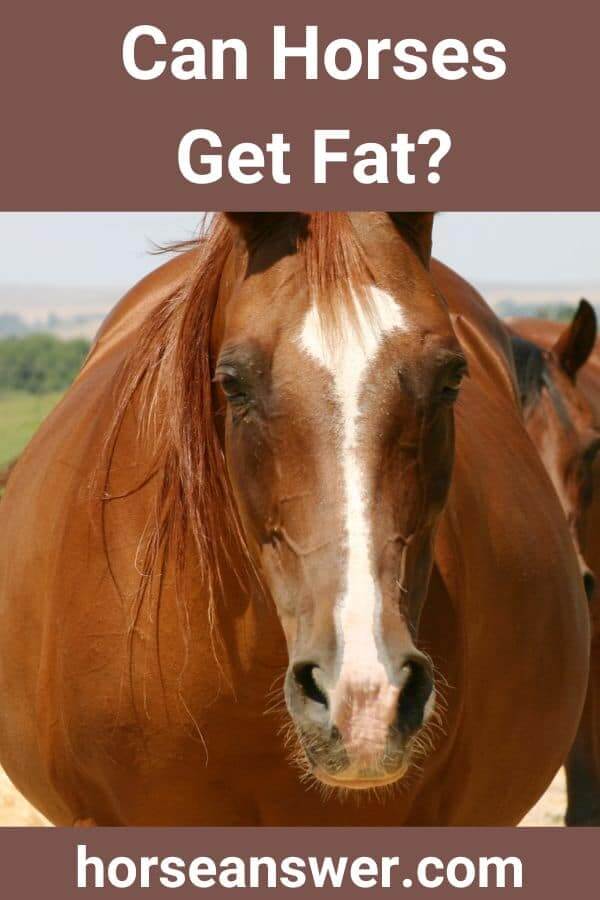Can Horses Get Fat? (Revealed!)
My son and I were out at a horse show the other day, and there were all kinds of shapes and sizes and colors of different horses.
Skinny horses, bulky horses, tall horses, short horses.
Every type of horse you could imagine.
Faced with all this multitude of different types of horse, my son suddenly asked me a question that caught me a bit off guard.
He asked me if horses could get fat.
I admit, I’d never really thought about it before, and I had an assumption, but I wanted to back that up, so I decided to look into it.
So, can horses get fat?
Yes, like any animal, horses can get fat. If their calorie intake exceeds the amount of physical activity and exercise they can get, they will put on weight. If it is eating more than it’s burning off, it will put on weight, and the horse may be prone to a number of potentially crippling conditions.
Horses are big animals that like to run around and get their exercise in, so horses putting on too much weight is uncommon with proper care.
That said, there’s still plenty of dietary issues that you should be aware of.
Can horses be fat?
The simple answer is yes.
Any animal can get fat, really, if they eat too much and don’t burn enough calories.
For the most part, in younger horses, weight gain happens for the same, simple reason it happens to the rest of us.
Overeating, under exerting.
Horses are big, bulky animals that may have to eat a lot to put on weight, but it can be done.
Many adult horses, also, do begin to retain unnecessary, excess weight due to the reduced activity and a slower metabolism.
It is harder to maintain a horse’s weight at a lower level, since it’s harder to lose the weight gained.
All horses can gain weight to the point of obesity, though.
It may take some longer than others, but it can always occur.
One very common problem for overweight horses is a condition called laminitis.
This disease can be potentially crippling, and is similar to diabetes in humans.
It restricts what they can eat in the future, and can lead to chronic pain and illness.
It’s a good idea to regularly check your horse’s weight, and keep a record of it to ensure it’s changing at a healthy rate.
So, how do horses get fat?
Let’s have a look.
Can horses get fat on hay?
A horse’s diet will consist, typically, of mostly hay.
Hay is good for horses, but it’s very low in calories to begin with, so they need to eat a great deal of it to keep their weight up to begin with, let alone getting fat on it.
If your horse’s diet is 75%-90% hay, then the likelihood that this is making it fat is quite low.
It’s more likely to do with a lack of activity and exercise, so in this case, try getting your horse out a bit more.
That said, your horse’s body type is also an important consideration.
There are different types of hay, and some are much higher in calories and protein than others.
Grass hay is generally perfectly adequate, especially for smaller horses.
Something like alfalfa hay is likely to be too high in protein for a smaller horse or pony.
So, as long as you feed the right type of hay, a horse’s hay won’t make it fat.
If you are overfeeding it on treats and snacks, this can quickly become a problem.
Remember, almost all of what your horse eats should be hay, and treats in the form of fresh fruit and vegetables occasionally is all else that should be in the horse’s diet.
How can you tell if your horse is overweight?
There a number of clear signs you can look for to tell if your horse is at a healthy weight, but as I said, it’s always important to keep a detailed record of your horse’s weight using a weight rope.
That said, here’s a few things you can look for that will be instantly visible on your horse.
First of all, its ribcage.
A horse’s ribcage should pretty much always be clearly visible, or at least easily palpable.
If you can’t see it or feel it with your hands, your horse may be on the way to being overweight.
There should be no crest visible on the top its neck, as this is where it can put on excess weight.
There should be no visible fat over the shoulder area, and again on the ribs.
There also should be no visible gully between the horse’s rear on top.
If you look carefully for all of these signs and catch them early on, you can get your horse onto a weight management program and get it back to health before it’s a problem.
So, while it’s relatively uncommon, you should always take great care with your horse’s diet, exercise and weight.
Even for a horse living a very healthy lifestyle, in old age they can begin to retain more weight.
Caring for your horse means looking out for these kinds of things, and being aware of what the best diet is for them.
If you carefully monitor their weight and make sure they’re getting plenty of exercise, you shouldn’t have a problem.
